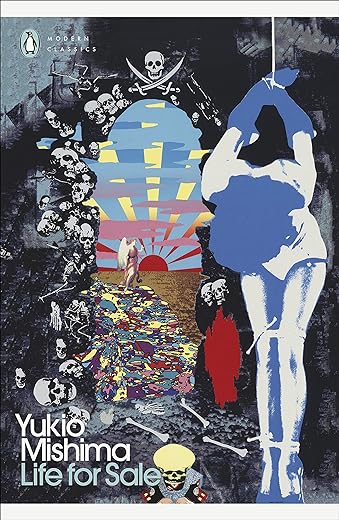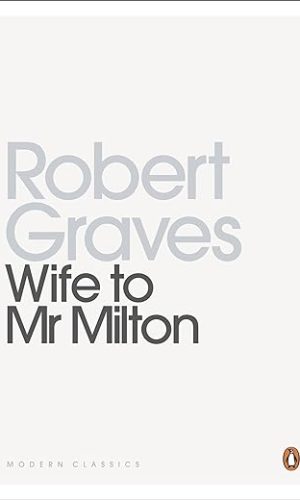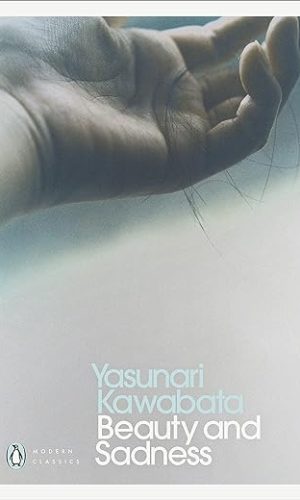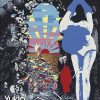Life for Sale (Penguin Modern Classics)
£8.60£9.50 (-9%)
‘The best book I’ve read this year … darkly comedic and full of tension and surprise’ Marina Abramovic
‘Life for sale. Use me as you wish. I am a twenty-seven-year-old male. Discretion guaranteed. Will cause no bother at all.’
When Hanio Yamada realises the future holds little of worth to him, he puts his life for sale in a Tokyo newspaper, thus unleashing a series of unimaginable exploits. A world of murderous mobsters, hidden cameras, a vampire woman, poisoned carrots, code-breaking, a hopeless junkie heiress and makeshift explosives reveals itself to the unwitting hero. Is there nothing he can do to stop it? Resolving to follow the orders of his would-be purchasers, he comes to understand what life is worth, and whether we can indeed name our price.
Read more
Additional information
| Publisher | Penguin Classics (4 Feb. 2021) |
|---|---|
| Language | English |
| Paperback | 192 pages |
| ISBN-10 | 0241333156 |
| ISBN-13 | 978-0241333150 |
| Dimensions | 12.9 x 1.1 x 19.8 cm |










by Richard Latham
After 4/5ths of this book I parked it for a while.
Not that this is not a fully engrossing and readable version of a Japanese classic. Rather I couldn’t get my head fully around the writing and the mystery that overwhelms the protagonist of this story.
Hanio Yamada on the face of it, young, attractive and successful struggles with his almost meaningless life.
When he wakes up in hospital he realises his attempt at suicide has failed. He sets out on a new venture. He will place an advert where his life is literally for sale. Whoever purchases it will be free to use him as they wish, in complete discretion and terminate his life at a time for their choosing and for their pleasure.
Thereafter, nothing is straightforward as we see and take a journey with Hanio as his life both unravels but curiously makes more sense to him.
First published in 1968 in Japanese Playboy it is considered a piece of appealing pulp fiction by one of the country’s most revered authors. A literary great, Yukio Mishima.
We are now indebted to Penguin Classics and a wonderful English translation by Stephen Dodd for making it assessable and available to modern readers.
It is clearly a satirical work about Tokyo life and wider Japanese society. One I found completely enjoyable and pleasing to read. In setting the book aside I wanted to think about this very different type of fiction and try to find more about the circumstances that brought about its writing.
In the process I forgot about it for a while and was delighted to pick it up again. The story remained fresh and absorbing. This final part of the mystery is both a remembering of all that befalls young Yamada as well as bringing the story to a dramatic conclusion.
In the process Hanio’s thinking turns full circle and he sees meaningless in other’s mundane existence while valuing his own life for the first time in his adult life.
Full of other genres and traditions in Japanese literature this is a book that will amuse and trouble you but in reading it you may glean more insight and empathy for humanity. It is a book with pace and purpose that will leave you breathless and wanting to learn more about this very different culture and read modern authors from Japan.
by Ren.C
This book is really something and will stay with me for some time. It’s dark, at times unpleasant, the descriptions of the female characters are very much outdated in their unapologetic over sexualisation. But somehow it’s enthralling, entertaining and thought provoking
by Darren Ware
I won’t go into too much detail. I also don’t want to out people off reading it as I think it’s an enjoyable book.
However after a while I did begin to lose interest little. If they ended it after the vampire part then it would of been getting a higher rating but each sale is like a round about. After several times going around, your going to want to get off. However it is a short read even at that and I would say give a go if it’s on sale
by Felix the cat
This was a very original book. I enjoyed the humour and the thinking behind it. The ending was superb with a great last sentence.
by Mr Creosote
English-speaking fans of Yukio Mishima have had a right treat in recent years, with three of his lesser-known works (Frolic of the Beasts, Star, and now Life for Sale) finally being published in English translation. Life for Sale dates from 1968, just two years before Mishma shocked the world by attempting to lead his cadre of young gay male martial arts enthusiasts on a military coup of Japan, and disembowelling himself in front of that military when the soldiers, instead of embracing Mishima’s manifesto for a return to nationalist Japanese imperial ideals, all just laughed at him. I say ‘shocked the world’, but to be honest, anyone who was shocked had really not been paying much attention to Mishima’s literary output. In particular, Life for Sale is a far cry from his final classy masterwork, the ‘Sea of Fertility’ tetrology of novels. It was originally published in serial form in Japan’s “Weekly Playboy” magazine, a fairly salacious ‘lads mag’ where Mishima’s story installments shared the pages with celebrity gossip, manga strips and pictures of nude ladies. I don’t want to give away plot spoilers, but regular Mishima readers will probably not be too surprised to learn that the tale features the lead character engaging if lots of shagging and grizly death whilst struggling with an existential crises brought on by what he perceives as the tawdry meaningless of modern life in post-war Japan. However unlike the lengthy noble and po-faced screeds of Mishima’s high brow novels, as befits its serialised format, Life for Sale is composed of fast-paced bite-sized mini-chapters, and unless I have been completely bamboozled by the translation, must surely be intended as a black comedy? The protagonist gets himself into a series of ever-more ludicrous situations, with a vibe which bears comparison with Tarantino’s ‘Pulp Fiction’. Taken entirely on its own merits, there is plenty to enjoy here, and Mishima’s steely skill in nailing the psychopathology of his characters loses little of its bite even in this lads’ mag lulz format. But the thing is, we know that within two years the author would prove in a very visceral way that he really wasn’t joking about this stuff at all. In truth, which was the sickest: post-war Japan, or Mishima himself?
by Patrick McParland
Strange story of a quiet professional man happy to give up on life and ends up experiencing a series of macabre events while selling his life.
by Stephen Burrows
I enjoyed the first half of this book, it is a really fun and wacky story and Mishima is clearly a great writer. But the challenges get a bit repetitive and rely on a similar joke (hey, I almost died!)
Still, worth a read a good introduction to the work of Mishima.
by David Roberts
I couldn’t finish the book, in the end it seems a lot of immature male fantasy. It is written in an interesting style which is quite compelling but the author is clearly just a baby really.